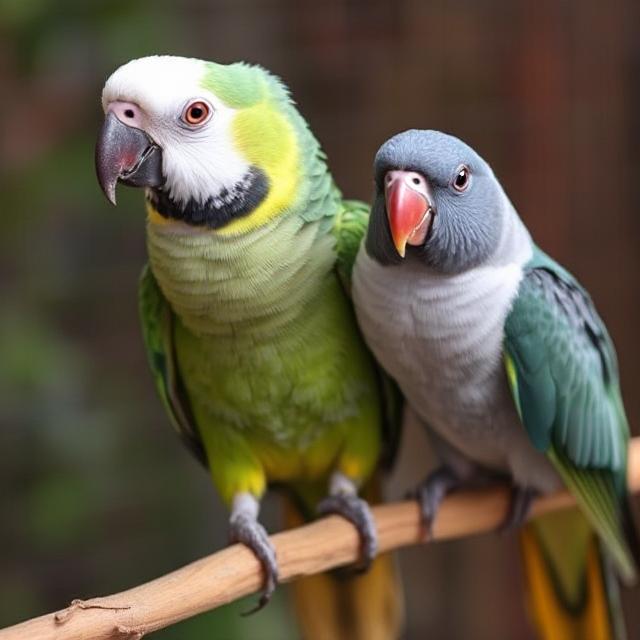How To Take Care Of Parrots For Beginners
How To Take Care Of Parrots For Beginners
Parrots are among the most intelligent, colorful, and social birds in the world. Their vibrant personalities and ability to mimic human speech make them wonderful companions. However, caring for a parrot is not as simple as keeping a regular pet bird. Parrots require attention, proper nutrition, mental stimulation, and a clean environment to stay healthy and happy. How to take care of parrots for beginners
If you’re a beginner and thinking of bringing a parrot into your home, this guide will help you understand how to take care of parrots the right way. Let’s explore everything you need to know—from choosing the right parrot species to feeding, training, and ensuring their overall well-being.
1. Choosing the Right Parrot Species
Before you buy or adopt a parrot, it’s essential to choose a species that fits your lifestyle. Some parrots are small and easier to manage, while others are large, noisy, and require more care and attention. How to take care of parrots for beginners
Popular Parrot Species for Beginners:
-
Budgerigar (Budgie): Small, cheerful, and easy to train. Ideal for first-time owners.
-
Cockatiel: Gentle, affectionate, and relatively quiet compared to larger parrots.
-
Lovebirds: Social and colorful but need companionship and attention.
-
Quaker Parrot: Playful and intelligent, great for learning basic tricks.
If you’re a beginner, start with a smaller species like a budgie or cockatiel before moving on to larger birds such as African Greys or Macaws, which require more experience and time commitment. How to take care of parrots for beginners
2. Setting Up the Perfect Cage
A parrot’s cage is its home, so it should be spacious, comfortable, and stimulating. The cage size should allow your parrot to stretch its wings fully and move around freely. How to take care of parrots for beginners
Key Cage Requirements:
-
Size: Bigger is always better. A small parrot like a budgie needs a cage at least 18x18x18 inches, while larger parrots require much more space.
-
Bar Spacing: Make sure the bars are close enough that your parrot cannot escape or get its head stuck.
-
Material: Choose a stainless-steel cage, as it’s durable and easy to clean.
-
Location: Place the cage in a bright room where there is some human activity, but avoid direct sunlight, cold drafts, or the kitchen (fumes can be dangerous).
-
Perches and Toys: Add natural wood perches, swings, and chewable toys to keep your parrot active and entertained.
Clean the cage regularly to prevent bacteria buildup and unpleasant smells. Change the lining and wash food and water dishes daily.
3. Proper Diet and Nutrition
Diet is one of the most important aspects of parrot care. A poor diet can lead to health problems, while a balanced diet can make your parrot energetic and live longer. How to take care of parrots for beginners
What to Feed Your Parrot:
-
Pellets: These should make up about 60–70% of your parrot’s diet. They are nutritionally balanced and available in pet stores.
-
Fresh Fruits and Vegetables: Offer apples, bananas, carrots, spinach, and broccoli. Avoid avocado, chocolate, caffeine, and onions—they’re toxic to parrots.
-
Seeds and Nuts: These are high in fat, so give them as treats, not main meals.
-
Clean Water: Always provide fresh, clean water and change it daily.
Avoid feeding your parrot only seeds, as they lack essential nutrients. Variety is key to a healthy and happy bird. How to take care of parrots for beginners
4. Social Interaction and Bonding
Parrots are incredibly social creatures. In the wild, they live in flocks and communicate constantly. A lonely parrot can easily become depressed or develop behavioral problems. How to take care of parrots for beginners
How to Bond with Your Parrot:
-
Spend at least an hour or two daily talking, playing, or training your parrot.
-
Use a calm voice and gentle hand movements.
-
Allow your parrot to perch on your finger or shoulder once it feels comfortable.
-
Avoid shouting or sudden movements—they can scare your bird.
Socialization helps your parrot trust you and develop a strong emotional connection. Remember, parrots thrive on companionship and attention.
5. Mental Stimulation and Playtime
Parrots are very intelligent and need constant mental stimulation to stay happy. A bored parrot may scream excessively, pluck its feathers, or show aggression.
Ways to Keep Your Parrot Entertained:
-
Provide a variety of toys and rotate them weekly.
-
Use puzzle feeders to make mealtime fun.
-
Play gentle music or nature sounds.
-
Teach your parrot simple tricks like waving, talking, or fetching.
Never leave your parrot in the cage all day. Allow it some supervised out-of-cage time to stretch its wings and explore safely. How to take care of parrots for beginners
6. Maintaining Hygiene and Health
Cleanliness plays a vital role in preventing infections and illnesses. How to take care of parrots for beginners
Daily Care Tips:
-
Replace cage liners and wash dishes every day.
-
Clean toys and perches weekly.
-
Bathe your parrot or mist it with water 2–3 times a week to keep feathers shiny and dust-free.
Common Health Problems:
-
Feather plucking (due to stress or boredom)
-
Respiratory infections
-
Obesity (from poor diet)
-
Overgrown nails or beak
If your parrot shows signs of lethargy, loss of appetite, or breathing difficulty, consult an avian veterinarian immediately. Regular checkups (once or twice a year) help detect early health issues. How to take care of parrots for beginners
7. Training Your Parrot
Training is not just about teaching tricks—it’s about building trust and communication. Start with simple commands and always use positive reinforcement.
Basic Training Tips:
-
Use treats like small fruit pieces or seeds as rewards.
-
Teach one command at a time, such as “step up” or “come here.”
-
Keep sessions short (10–15 minutes) to avoid tiring your bird.
-
Be patient and consistent. Never punish your parrot—it will only make it fearful.
With time and care, your parrot will learn to respond to your voice and even mimic words or sounds. How to take care of parrots for beginners
8. Ensuring Safety at Home
How to take care of parrots for beginners. Your home can be full of hidden dangers for parrots. When you let your parrot out of its cage, make sure the environment is safe.
Parrot Safety Checklist:
-
Close windows and doors to prevent escapes.
-
Keep away from ceiling fans and open flames.
-
Avoid using non-stick cookware (the fumes are deadly to birds).
-
Remove small objects your parrot could swallow.
Supervision is essential during free-flying or playtime to prevent accidents. How to take care of parrots for beginners
9. Understanding Parrot Behavior
Every parrot has a unique personality. Learning to understand your bird’s body language helps you build a stronger relationship. How to take care of parrots for beginners
Common Behaviors:
-
Fluffed feathers: Relaxed or ready to sleep.
-
Tail wagging: Happiness or excitement.
-
Biting: Fear, anger, or territorial behavior.
-
Screaming: Attention-seeking or boredom.
If your parrot bites, stay calm. Don’t yell or hit—it will break the trust. Instead, identify what caused the behavior and address it patiently.
10. Long-Term Commitment
Parrots can live for many years—some species over 50! This means owning a parrot is a long-term responsibility. You must be ready to care for it consistently with love, patience, and dedication. How to take care of parrots for beginners
Before Getting a Parrot, Ask Yourself:
-
Can I dedicate time daily to interact and train my parrot?
-
Am I prepared for the noise and mess?
-
Do I have the budget for food, toys, and vet visits?
If the answer is yes, a parrot can become one of the most rewarding companions you’ll ever have. How to take care of parrots for beginners
Final Thoughts
Learning how to take care of parrots for beginners is about understanding their needs—emotional, physical, and social. These colorful birds are intelligent and affectionate but require time, effort, and love to thrive. With the right environment, balanced diet, and consistent attention, your parrot will reward you with years of friendship, laughter, and endless chatter. How to take care of parrots for beginners
Caring for a parrot may be a challenge at first, but once you earn their trust, you’ll realize it’s one of the most joyful experiences in the world.

